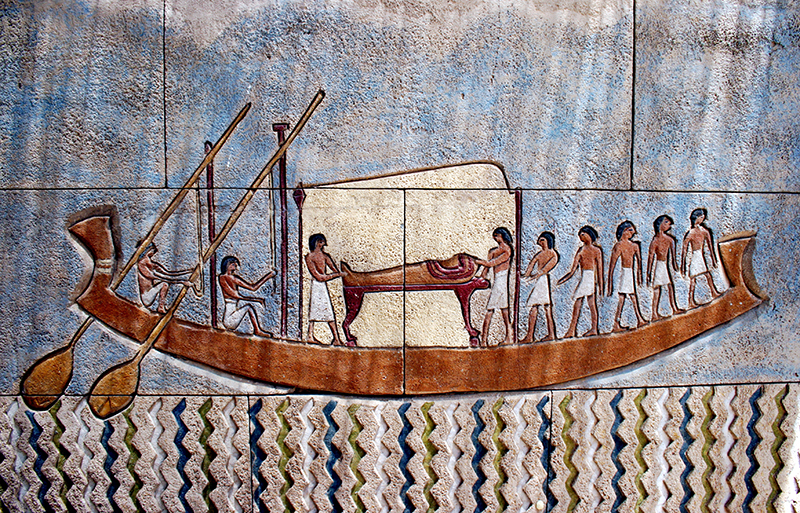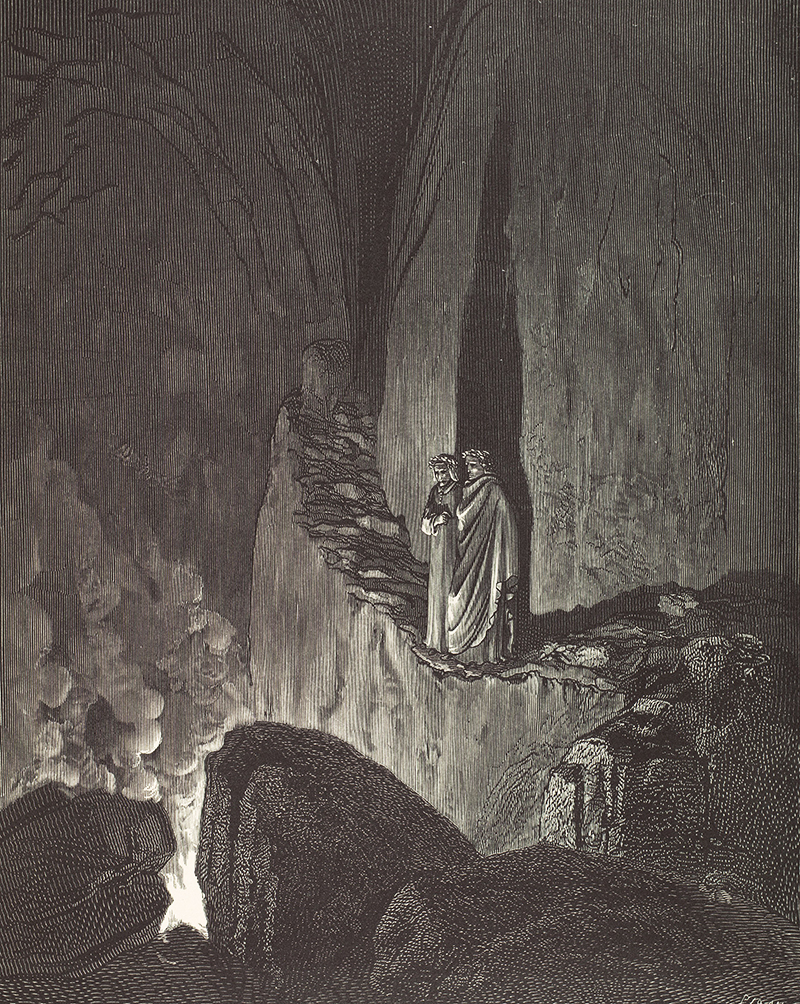The Afterlife
Contents
-
1. Overview2. Views of the Afterlife3. Do We Have an Immortal Soul?4. Heaven and Hell5. Resurrection(s)6. More on Judgment
Overview
Death is an unavoidable part of our life experience. Humanity’s quest to extend life through various methods is a testament to a seemingly innate desire to extend ourselves beyond our limitations. Medical advancements, bioengineering and cryogenics speak to our difficulty in accepting the inevitable end of life.
Even simple turns of phrase remind us that death is something we struggle to understand. The common expression passed on is a euphemism often used in Western cultures when someone dies. As linguistics experts Keith Allan and Kate Burridge explain, “many peoples have regarded death as the start of the soul’s journey into the afterlife, and buried their dead with all sorts of paraphernalia . . . to help them on the way. Accordingly, death is often represented euphemistically as a journey to a better place for the soul of the dead person. The metaphors that arise from this notion include part, depart, pass, pass away, pass on, pass over and arrival at the final resting place” (Forbidden Words: Taboo and the Censoring of Language).
Whatever words are used, belief in an afterlife is common in most cultures and traditions. Even for people who aren’t religious or who don’t actively believe in an afterlife, the vernacular for referring to death subtly communicates the ancient idea that there must be something beyond it. The same theme has echoed within cultural and religious traditions over the centuries in various forms, some of which we’ll look at here. Then we’ll examine what the Bible says about the human experience after life.
Views of the Afterlife
Some of the earliest documented concepts of what happens after death come from the Egyptians, who believed an immortal soul leaves the physical body at death to continue life in another existence. But the recurring theme of an immortal soul is consistent across many eras and cultures.

An Egyptian painting depicts a “solar barge” carrying the resurrected king across the heavens with the sun god Ra.
Manuel Velasco, iStock
Western concepts of an afterlife are heavily influenced by Platonic philosophy, which proposed that human consciousness was an immortal soul trapped in a physical body. The Greeks held that, in the physical state, souls unconsciously long to escape the body and the physical realm, and that at death the soul returns to the spiritual realm where it originated.
In some modern Christian and Islamic traditions, an immortal soul may go to a place of waiting for final judgment and assignment to heaven (paradise) or hell (punishment). Others hold that the soul goes directly to heaven or hell at death.
Judaism has taken on a variety of afterlife concepts. Modern Jewish ideas, also influenced by Greek philosophy, include an immortal soul leaving the body after death.
Alternative afterlife concepts are found in other faith traditions. Buddhism and Hinduism, for instance, teach reincarnation, while many indigenous cultures embrace the belief that, after death, life is reincorporated into the natural world with the spirits of their ancestors. Some who don’t identify with spirituality lean on such concepts as simulation theory for ways to understand death and afterlife, while an atheistic approach includes a broad array of ideas, many of which accept a complete end to who and what we are in this life.
Depictions of an afterlife are likewise found throughout art and culture. Films and television shows such as Ghost and The Sixth Sense, and The Good Place and Ghosts (US and UK versions of the same series) all illustrate the concept of an immortal soul.
With these ideas in mind, we’ll explore the afterlife through the lens of the Bible as a complete narrative explaining humanity’s purpose.
In the biblical book of Ecclesiastes, the author muses that God created humans with a sense of eternity but without a full understanding of what that entails.
Ecclesiastes 3:11 (Complete Jewish Bible)
He has made everything suited to its time; also, he has given human beings an awareness of eternity; but in such a way that they can’t fully comprehend, from beginning to end, the things God does.Let’s start with the Hebrew Scriptures to shed light on what happens when we die.
Do We Have an Immortal Soul?
Across faith traditions, the most commonly shared afterlife concept is that of an immortal soul. Does the biblical narrative support this?
Genesis 2:7 (King James Version)
And the Lord God formed man of the dust of the ground, and breathed into his nostrils the breath of life; and man became a living soul [Hebrew: nephesh].The word nephesh is used in various ways throughout the Hebrew Scriptures and with a variety of meanings, but in the context of Genesis 2:7, the term “living being” comes closest to the intended meaning.
From Life to Life
Several major religions today teach the immortality of the soul, though each puts its own fingerprint on the idea.
While there are no references to an immortal soul in Hebrew Scripture, we do find the term soul used in English translations. The word most often translated from Hebrew as “soul” is nephesh. According to the Hebrew and Aramaic Lexicon of the Old Testament, nephesh can mean, among other things, “breath,” “living being” or “life.”
The Hebrew perspective here is that humans became living beings when God breathed life into them. When they died, the breath stopped and consciousness ended.
We do find references to spirit in the Hebrew, but is that the same as an immortal soul? For example:
1 Samuel 1:15 (KJV)
And Hannah answered and said, “No, my lord, I am a woman of a sorrowful spirit [ruach]: I have drunk neither wine nor strong drink but have poured out my soul [nephesh] before the Lord.”The word translated “spirit” here (ruach) can mean “breeze,” “wind” or “breath.” Does that mean we have a spirit in us, and is that the same as a soul? In this case, Hannah is simply expressing a sorrowful state of mind. This is made clear in the NET Bible’s translation: “But Hannah replied, ‘That’s not the way it is, my lord! I am under a great deal of stress.’”
The word ruach can mean different things in different contexts; for example, wind or the air we breathe. It can also illustrate the idea of an animating power or, in rare instances, a person’s thinking process. It does not, however, communicate the idea of individual immortal souls.

Solomon speaks to a shared death experience for all creatures; humans and animals face the same fate when the breath ends—death.
Ecclesiastes 3:19 (NRSV)
For the fate of humans and the fate of animals is the same; as one dies, so dies the other. They all have the same breath, and humans have no advantage over animals; for all is vanity.From its first chapters, the Bible consistently portrays death in a similar way:
Genesis 3:19 (NRSV)
“By the sweat of your face you shall eat bread until you return to the ground, for out of it you were taken; you are dust, and to dust you shall return.”Ecclesiastes 9:5 (NRSV)
The living know that they will die, but the dead know nothing; they have no more reward, and even the memory of them is lost.We see from these scriptures that the Hebrew view of death was that life ends when the breath leaves the body; we function as psychophysical beings with the power of intelligence, and we are built from the elements of earth. We return to this original earth state after death.
Heaven and Hell
How do the concepts of heaven and hell relate to biblical teaching about the afterlife?
The idea of a place of ongoing torment is so prevalent in the world’s religions and cultures that the word hell immediately brings a certain image to mind. But it doesn’t come from the Bible. The Interpreter’s Dictionary of the Bible has this to say: “Nowhere in the Old Testament is the abode of the dead regarded as a place of punishment or torment. The concept of an infernal ‘hell’ developed in Israel only during the Hellenistic period” (beginning in the fourth century BCE). This is when many Greek religious and philosophical ideas became influential throughout the region. Merriam-Webster’s Encyclopedia of World Religions points out that “many formal aspects of Hellenistic religion . . . persist in the Jewish and Christian traditions today.”

In this 1866 Gustave Doré wood engraving, featured in printed editions of Dante’s Inferno, the Roman poet Virgil leads Dante on a guided tour of hell.
In the New Testament, three words are translated as “hell” (gehenna, hades and tartaroo), none of which refer in the Bible to a place of torment for immortal souls.
Similar misconceptions have been tied to ideas about heaven. The apostle John states clearly that only one individual has ever ascended to heaven.
John 3:13 (NRSV)
No one has ascended into heaven except the one who descended from heaven, the Son of Man.After His resurrection, Jesus spoke with Mary Magdalene:
John 20:17 (NRSV)
Jesus said to her, “Do not hold on to me, because I have not yet ascended to the Father. But go to my brothers and say to them, ‘I am ascending to my Father and your Father, to my God and your God.’”In addition to showing that Christ was resurrected first and ascended to heaven afterward, this passage identifies heaven as God’s dwelling place.
So with these references as a foundation, the existence of heaven is established, but we don’t see anyone, not even Christ, going directly to heaven after death.
That Christ was resurrected is a central belief in Christianity, but what happens to everyone else?
1 Corinthians 15:20–23 (NRSV)
But in fact Christ has been raised from the dead, the first fruits of those who have died. For since death came through a human being, the resurrection of the dead has also come through a human being; for as all die in Adam, so all will be made alive in Christ. But each in his own order: Christ the first fruits, then at his coming those who belong to Christ.Is it just those who have been saved who will be resurrected? Do you have to be a good person, live a Christlike life, or believe something specific?
Acts 24:15 (NRSV)
I have a hope in God—a hope that they themselves also accept—that there will be a resurrection of both the righteous and the unrighteous.Revelation 20:12 (NRSV)
And I saw the dead, great and small, standing before the throne, and books were opened. Also another book was opened, the book of life. And the dead were judged according to their works, as recorded in the books.These references illustrate that resurrection is for everyone who has ever lived, no matter who you are, what you believe, or what you have done—whether good or bad.
John 5:28–29 (English Standard Version)
Do not marvel at this, for the hour is coming when all who are in the tombs will hear his voice and come out, those who have done good to the resurrection of life, and those who have done evil to the resurrection of judgment.But what is the meaning of “judgment”? Will some people be resurrected just to be condemned for how they lived? Finding the answer to this question requires understanding the context and more about the subject of resurrection.
Resurrection(s)
Based on the foundation we’ve established thus far, we see that the end of physical life corresponds with the end of all aspects of the living being. But according to the Bible, that isn’t where everything ends. The following scriptures point to a resurrection back to life:
1 Samuel 2:6 (NET Bible)
The Lord both kills and gives life; he brings down to the grave and raises up.Isaiah 26:19 (NRSV)
Your dead shall live, their corpses shall rise. O dwellers in the dust, awake and sing for joy! For your dew is a radiant dew, and the earth will give birth to those long dead.Ezekiel 37:4–6 (NRSV)
Then he said to me, “Prophesy to these bones, and say to them: O dry bones, hear the word of the Lord. Thus says the Lord God to these bones: I will cause breath to enter you, and you shall live. I will lay sinews on you, and will cause flesh to come upon you, and cover you with skin, and put breath in you, and you shall live; and you shall know that I am the Lord.”(It’s worth noting that the last passage, from Ezekiel, not only prophesies a future resurrection; it also serves as a metaphor for God’s eventual restoration of the ancient nation of Israel after they were taken into captivity a few centuries before the time of Christ.)
Throughout the Scriptures we’re told that God raises up the dead from the grave. We can experience death and return to a living state. The following passage from the Apocrypha reflects Jewish understanding around the time of Christ:
2 Maccabees 7:9 (New American Bible [Revised Edition])
With his last breath [a young man being tortured] said: “You accursed fiend, you are depriving us of this present life, but the King of the universe will raise us up to live again forever, because we are dying for his laws.We see from these Old Testament and historical sources that the idea of a resurrection after death was well established in the Jewish world.
As we transition to the Apostolic Writings, or New Testament, we see that the traditions and views commonly held by the Jewish community of the time haven’t changed. Jesus also speaks of resurrection.
Mark 12:25 (NRSV)
[Jesus replied to the Sadducees,] “For when they rise from the dead, they neither marry nor are given in marriage, but are like angels in heaven.”Here Jesus refutes the questions posed by a group who tried to bring Him into a debate about the Levirate marriage tradition (Deuteronomy 25:5). In response, Jesus affirms the resurrection from the dead and clarifies that those who are resurrected as spirit beings receive bodies like the angels and do not marry, the implication being that the spiritual body is without gender.
John’s Gospel account provides more details about resurrection to eternal life, how it works, and what is required to participate.
John 6:40, 44 (NRSV)
“This is indeed the will of my Father, that all who see the Son and believe in him may have eternal life; and I will raise them up on the last day. . . . No one can come to me unless drawn by the Father who sent me; and I will raise that person up on the last day.”John 3:16 (NRSV)
For God so loved the world that he gave his only Son, so that everyone who believes in him may not perish but may have eternal life.Along with a reference to resurrection, we see that eternal life is identified as the full potential for humans in the plan of God. We also find a statement that only God can call individuals into a unique relationship with Him, whether in this life or after being resurrected in the future.
John 6:54 (NRSV)
Those who eat my flesh and drink my blood have eternal life, and I will raise them up on the last day.John 11:25–26 (NRSV)
Jesus said to her, “I am the resurrection and the life. Those who believe in me, even though they die, will live, and everyone who lives and believes in me will never die. Do you believe this?”Several of the scriptural references we’ve covered so far hint at more than one resurrection. This is worth exploring further.
The Death and Resurrection of Jesus: Weighing the Evidence
New Testament scholar Craig A. Evans and Vision’s David Hulme discuss some of the evidence for Jesus Christ’s death and resurrection.
The Bible describes an order to resurrection. As we noted above, 1 Corinthians 15:22–23 tells us that Christ rose first; next, those who have been called into a relationship with Him will be resurrected to eternal life. Paul expands on this in his first letter to the Thessalonians.
1 Thessalonians 4:13–17 (NRSV)
But we do not want you to be uninformed, brothers and sisters, about those who have died, so that you may not grieve as others do who have no hope. For since we believe that Jesus died and rose again, even so, through Jesus, God will bring with him those who have died. For this we declare to you by the word of the Lord, that we who are alive, who are left until the coming of the Lord, will by no means precede those who have died. For the Lord himself, with a cry of command, with the archangel’s call and with the sound of God’s trumpet, will descend from heaven, and the dead in Christ will rise first. Then we who are alive, who are left, will be caught up in the clouds together with them to meet the Lord in the air; and so we will be with the Lord forever.This passage is sometimes cited to say Christians go to heaven at death, but this is about Christ’s return from heaven to the earth at His second coming. For those believers who are alive at that time, it speaks of a change in state from physical to spiritual, without experiencing death. They will meet Him “in the air” as He descends and is joined by those who’ve died in the faith and been resurrected to spirit life immediately before believers who are still alive.
But what about all those who were never given the opportunity in this life to come to know and follow Him? The apostles came to understand that the resurrection of believers is followed by a second resurrection—this one of, or to, judgment—a time of coming into a relationship with God and learning to live according to His way.
John 5:28–29 (ESV)
Do not marvel at this, for an hour is coming when all who are in the tombs will hear his voice and come out, those who have done good to the resurrection of life, and those who have done evil to the resurrection of judgment.More on Judgment
The Bible indicates that there are different times of judgment. Those called into a relationship with God in this lifetime (John 6:44) are not meant to just believe in Christ but also are being judged, or evaluated, according to their dedication to following God’s way and taking on the loving and compassionate mind of Christ.
1 Peter 4:17 (NRSV)
For the time has come for judgment to begin with the household of God. . . .Revelation 20:12 (NRSV)
And I saw the dead, great and small, standing before the throne, and books were opened. Also another book was opened, the book of life. And the dead were judged according to their works, as recorded in the books.But judgment can be a confusing term. For clarity, it’s worth noting that judgment, in a biblical context, doesn’t typically suggest a courtroom scene with the sentencing and punishment of transgressors as the goal. It may be helpful to think of it more as an opportunity to make things right—to eradicate oppression and injustice, resulting in a joyful, just and peaceful world. A couple of examples from the Bible serve to illustrate the kind of judging that God inspires.
Psalm 72:1–4 (NRSV)
Give the king your justice, O God, and your righteousness to a king’s son. May he judge your people with righteousness and your poor with justice. May the mountains yield prosperity for the people, and the hills, in righteousness. May he defend the cause of the poor of the people, give deliverance to the needy, and crush the oppressor.Psalm 96:10–13 (NRSV)
Say among the nations, “The Lord is king! The world is firmly established; it shall never be moved. He will judge the peoples with equity.” Let the heavens be glad, and let the earth rejoice; let the sea roar and all that fills it; let the field exult and everything in it. Then shall all the trees of the forest sing for joy before the Lord, for he is coming, for he is coming to judge the earth. He will judge the world with righteousness and the peoples with his truth.Those who have been called into a relationship with God, and who are committed to being part of the family of God today, thus have the opportunity to live in line with God’s purpose—a process of reconciliation, learning, practice, evaluation and acceptance. Those who insist on rejecting God, after being given this opportunity, will in turn be rejected by Him, thereby subjecting themselves to judgment in the more traditional sense.
The message for those who do choose to follow Christ in this life is thus supremely hopeful and encouraging.
John 3:14–16 (NRSV)
“. . . so must [Jesus] be lifted up [i.e., crucified] that whoever believes in him may have eternal life. For God so loved the world that he gave his only Son, so that everyone who believes in him may not perish but may have eternal life.”As other passages point out, however, Jesus did not die only for those who would come to believe in Him in this life. Notice the parenthetical statement in the following passage:
Revelation 20:4–5 (NRSV)
Then I saw thrones, and those seated on them were given authority to judge. . . . They came to life and reigned with Christ a thousand years. (The rest of the dead did not come to life until the thousand years were ended.) This is the first resurrection.Verse 4 references a 1,000-year period, during which Christ will lead a complete restoration of the earth (the New Testament writer Luke mentions that restoration in the book of Acts, noting that Jesus “must remain in heaven until the time of universal restoration that God announced long ago through his holy prophets” [Acts 3:21]); after that thousand years, often referred to as the Millennium, everyone who has ever lived will be resurrected and given the opportunity to live again.
Is Your Time Running Out?
Must a person be converted to Christianity in this life or suffer eternal punishment in the next? Not according to the Bible.
Those who are part of what is thus a second resurrection will be given a physical body for their time of judgment—their opportunity to learn and follow God’s ways—in this restored world, which will be full of equity and without oppression as a result of God’s righteous judgment. God’s purpose is for humankind and all of creation to be reconciled to Him as He establishes justice on earth.
In the Psalms we find additional references to God’s righteous judgments. For example,
Psalm 119:137–138 (NRSV)
You are righteous, O Lord, and your judgments are right. You have appointed your decrees in righteousness and in all faithfulness.
God will establish a kingdom of righteous justice, which everyone who has ever lived will be resurrected to experience.
Revelation 20:11–15 (NRSV)
Then I saw a great white throne and the one who sat on it; the earth and the heaven fled from his presence, and no place was found for them. And I saw the dead, great and small, standing before the throne, and books were opened. Also another book was opened, the book of life. And the dead were judged according to their works, as recorded in the books. And the sea gave up the dead that were in it, Death and Hades [i.e., the grave] gave up the dead that were in them, and all were judged according to what they had done. Then Death and Hades were thrown into the lake of fire. This is the second death, the lake of fire; and anyone whose name was not found written in the book of life was thrown into the lake of fire.This period will provide time for everyone to learn the ways that lead to eternal life and to live in a relationship with God. After this they will be judged, or evaluated, based on their response. Each person will have the chance to account for their own decisions as they either reject or accept their personal calling to become part of the family of God—His children.

But His hope is that all will in fact accept that calling.
2 Peter 3:9 (NRSV)
The Lord is not slow about his promise, as some think of slowness, but is patient with you, not wanting any to perish, but all to come to repentance.Matthew 18:14 (NET)
In the same way, your Father in heaven is not willing that one of these little ones be lost.The overarching concept through all Scripture is the intent for every human to know God’s way of life at the time God determines is right for each. Everyone will be invited into a relationship with the Creator at a unique time and will have the opportunity for eternal life.
Why Eternal Life?
The biblical narrative defines the purpose for all of creation: God and Christ are developing an extended family to live according to the ways of love that Jesus Himself exemplified.
Romans 8:29 (NRSV)
For those whom he foreknew he also predestined to be conformed to the image of his Son, in order that he might be the firstborn within a large family.The work to create this extended family begins with physical human beings who learn and grow to reflect the character of God, understanding and practicing the ways that lead to peace and justice.
Romans 8:19–21 (NRSV)
For the creation waits with eager longing for the revealing of the children of God; for the creation was subjected to futility, not of its own will but by the will of the one who subjected it, in hope that the creation itself will be set free from its bondage to decay and will obtain the freedom of the glory of the children of God.Every human who has ever lived—no matter who they were, their national origin, what they believed or how they lived—will be given the opportunity to receive God’s calling and be transformed into an eternal being, becoming part of the family of God forever.
Hebrews 2:5–8, 10–13 (NRSV)
“Now God did not subject the coming world, about which we are speaking, to angels. But someone has testified somewhere, ‘What are human beings that you are mindful of them, or mortals, that you care for them? You have made them for a little while lower than the angels; you have crowned them with glory and honor, subjecting all things under their feet.’ . . . As it is, we do not yet see everything in subjection to them, . . . It was fitting that God, for whom and through whom all things exist, in bringing many children to glory, should make the pioneer of their salvation perfect through sufferings. For the one who sanctifies and those who are sanctified all have one Father. For this reason Jesus is not ashamed to call them brothers and sisters, saying, ‘I will proclaim your name to my brothers and sisters, in the midst of the congregation I will praise you.’ . . . And again, ‘Here am I and the children whom God has given me.’”In putting together the various biblical passages on the subject, we can see what an encouraging future God has planned for all of humanity.




